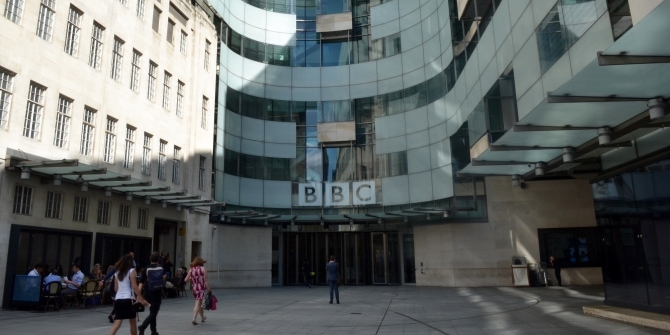 The three main UK political parties – the Conservatives, the Liberal Democrats and Labour – have set out their policy priorities for the media & telecoms sectors in their party manifestos. A recent report from Enders Analysis highlights areas of convergence and divergence between them in different areas of TMT policy. Although there will be considerable policy continuity from one government to the next in some areas there are also substantial areas of disagreement between the parties, Enders writes, including on press regulation. Here is an extract from the report, summarising progress in this area during the last parliament, and outlining the different parties’ approaches going forward.
The three main UK political parties – the Conservatives, the Liberal Democrats and Labour – have set out their policy priorities for the media & telecoms sectors in their party manifestos. A recent report from Enders Analysis highlights areas of convergence and divergence between them in different areas of TMT policy. Although there will be considerable policy continuity from one government to the next in some areas there are also substantial areas of disagreement between the parties, Enders writes, including on press regulation. Here is an extract from the report, summarising progress in this area during the last parliament, and outlining the different parties’ approaches going forward.
In his Report issued in November 2012, Lord Justice Leveson recommended a system of what he called ‘independently-led self-regulation’ for the press. The idea was that the press would create a regulator for itself, but independent of itself, which would then be judged against criteria of adequacy by Ofcom and, if it met those criteria, recognised. Legislation would set out the criteria and the recognition process, introduce a variety of legal incentives to join a recognised regulator, and give Ofcom the power to regulate directly any significant publishers which refused to join a recognised regulator. The Conservatives were more reluctant than Labour or the Liberal Democrats to impose regulation on the press through legislation, and because all parties wanted to proceed on the basis of cross-party agreement, the system that came to be implemented differed from Leveson’s recommendations in three major respects.
First, and most crucially, the incentives to join a recognised regulator were substantially weakened. Although Labour supported Leveson’s proposed role for Ofcom, the Conservatives and Liberal Democrats were against, so Ofcom’s role was eliminated: its recognition function was to be fulfilled by a dedicated panel, and its role as a backstop regulator was dropped altogether. So a major incentive to set up and join a recognised regulator – the threat of direct regulation by Ofcom – was removed. Of Leveson’s proposed legal incentives, two were carried forward: exemplary damages for unregulated publishers and the shifting of claimants’ costs onto publishers if an unregulated publisher was sued (the rationale being that if the publisher had joined a regulator, low-cost arbitration would have been open to the claimant, so by staying unregulated a publisher would deprive claimants of low-cost resolution of their claim). The first incentive was scheduled to be introduced a year after the Recognition Panel was set up; the second would only apply once there was a recognised regulator for publishers to join. It then took until November 2014 to set up the Recognition Panel, so the first incentive doesn’t come into effect for another six months. The press has signalled its intention to challenge it in the European Court of Human Rights, and British judges may be reluctant to use it anyway.
The second major departure from Leveson was that instead of setting up the new system via statute – so-called ‘statutory underpinning’ – a Royal Charter was used at the suggestion of the Conservatives. Legislative changes were still required to give effect to the legal incentives and protect the Royal Charter from amendment by less than a two-thirds majority of the Commons; they were incorporated into bills passing through Parliament at the time. The third departure was over the criteria for an adequate regulator laid out by Leveson, which were diluted in a number of significant respects in order to address press concerns.
In spite of those concessions, a majority of the press signed up to the Independent Press Standards Organisation (IPSO), whose chair declared that it would not seek approval by the Recognition Panel. IPSO’s structure violates the criteria in the Royal Charter and suffers from the same failings as the regulator which Lords Hunt and Black proposed to Leveson at his Inquiry, and which he strongly criticised in his report, notably for a lack of independence from the industry.
More recently, an alternative to IPSO has emerged: IMPRESS. It has funding from private donations and is seeking to meet the Royal Charter criteria, but it is noncommittal on the prospect of actually applying for recognition and, more importantly, hasn’t been able to get a major publisher to sign up yet. Without a backstop regulator for recalcitrant publishers, the incentives to set up a regulator and seek recognition are weak. The crucial question is whether a publisher will break ranks and join IMPRESS, which can then seek recognition. Until one does, there are limited costs to refusing to be regulated in line with Leveson’s criteria. Even if IMPRESS does seek recognition, publishers could try and delay that process through legal challenge. The only three major publishers outside IPSO are Guardian Media Group, Independent Print Ltd. and Pearson (which publishes The Financial Times and has a 50% stake in The Economist).
The trigger for a change to this situation will be the delivery of the report to Parliament by the Recognition Panel which is due a year after it starts accepting recognition applications. That report must tell Parliament if there is a recognised regulator and, if there is one, whether the system fails to cover all ‘significant relevant publishers’. The Panel recently indicated to the House of Lords that though they are not able to accept applications yet, they intend to be in a position to do so “well ahead of November” this year, so the report will presumably arrive some time in H2 2016. At that point the government will be faced with a dilemma – to accept that IPSO is a fait accompli and the Royal Charter system has failed, or try to improve the system with the aim of securing press compliance.
Our reading of the situation is that the Conservatives would be happy with the first option; they do not mention press regulation in their manifesto, except to say that they set up the Royal Charter. As Sajid Javid recently commented, “I think we have achieved what we set out to do. Everyone accepted the old system, the Press Complaints Commission, didn’t work. Our job is done as a government. It’s up to the Press.” The Liberal Democrats have said explicitly in their manifesto that they would pursue the second: “if, in the judgment of the Press Recognition Panel, after 12 months of operation, there is significant non-cooperation by newspaper publishers, then – as Leveson himself concluded – Parliament will need to act, drawing on a range of options including the legislative steps necessary to ensure that independent self-regulation is delivered. Where possible, we would seek to do this on the same cross-party basis that achieved the construction of the Leveson scheme by the Royal Charter.” Labour’s manifesto is vague: they “expect the industry to establish a mechanism for independent self-regulation, which delivers proper redress for individuals, as set out in the Royal Charter, and agreed by all parties in Parliament. We made a promise to victims of the phone hacking scandal. We stand by that promise and will keep it.” Labour’s shadow minister of state, Chris Bryant, has said the party will wait for the Recognition Panel’s report to Parliament before they form a judgement on whether the system needs revision.
In our view, Labour are likely to seek a tougher set of incentives. The question is, which would actually work? In his Report, Leveson writes “Ultimately, the one incentive that we have heard about that has been demonstrated to be effective is the realistic threat of press standards legislation if an adequate voluntary body with full coverage is not forthcoming.” If Labour are not prepared to threaten that, do they have an equally powerful alternative?
This extract from Enders Analysis’ report on Party positions on media & telecoms for GE2015 is reproduced here with permission and thanks. This post gives the views of the authors and does not represent the position of the LSE Media Policy Project blog, nor of the London School of Economics and Political Science.





